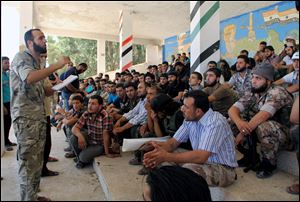
Key Syrian rebel leader dies of wounds
11/18/2013
Abdul-Qadir Saleh, left, the chief commander of the Tawhid Brigade, the main rebel outfit in Aleppo province, speaks to his fighters ahead of an attack on government troops, in Aleppo, Syria, in August.
BEIRUT — The leader of one of Syria’s most prominent rebel units died early today of wounds sustained during a strike by government forces last week, his group said, dealing another blow to fighters reeling from a series of recent battlefield losses.
The death of Abdul-Qadir Saleh, founder of the Tawhid Brigade, followed advances by President Bashar Assad’s troops against rebels on two key fronts: the capture of a string of opposition-held suburbs south of Damascus and the taking of two towns and a military base outside the northern city of Aleppo.
An ongoing offensive meanwhile is driving hundreds of refugees into neighboring Lebanon, as government forces seek to dislodge rebels from a mountainous area that stretches north of the Syrian capital. A total of 6,000 have crossed to a Lebanese border town over the last three days, the U.N. says.
The Tawhid Brigade is one of Syria’s best known and powerful rebel groups, with an estimated 10,000 fighters, and is particularly strong in Aleppo province. Under Saleh’s command, the group last year spearheaded a rebel push that seized large sections of the provincial capital Aleppo.
On Thursday night, a government air strike hit its command post in Aleppo province, according to local activists and the Britain-based Syrian Observatory for Human Rights. The 34-year-old Saleh was severely wounded and later died in a hospital in Turkey, said a brigade spokesmen who goes by the name of Akram al-Halaby. Many rebels do not use their real names, fearing they or their families will be identified and targeted by security forces.
The strike also killed a senior brigade officer, Abu Tayeb, and wounded another spokesman, Saleh Anadan.
Saleh was buried in his hometown of Marea in Aleppo province, al-Halaby told The Associated Press. The brigade’s political chief, Abdul-Aziz Salameh, who was lightly wounded in Thursday’s shelling, was appointed to succeed Saleh, he said.
Salameh himself announced Saleh’s death in a video uploaded to YouTube by the group. Flanked by somber looking men, some in military fatigues and others in robes typical of conservative scholars, he urged fighters to close ranks.
“Our martyrs are in heaven and yours are in hell,” he said, addressing Assad’s forces.
The Tawhid Brigade was once part of the mainstream Free Syrian Army, considered to be the military wing of Syria’s exiled Western-backed opposition. But in September, the brigade broke away and later formed the Islamic Authority, a coalition of Islamic rebel groups, including one linked to al-Qaeda.
Saleh’s trajectory reflected that of many ordinary Syrians who joined the armed uprising against Assad’s rule. He was a married merchant who took part in peaceful demonstrations that began in March 2011. After a violent crackdown by security forces, Syria’s conflict became an armed uprising and Saleh turned to guns.
He founded the Tawhid — or Monotheism — Brigade some 10 days before rebels overran and seized parts of Aleppo, al-Halaby said.
A video uploaded to social media networks in 2012 shows Saleh delivering a monologue as a bomb or shell hits near a building in Aleppo, causing him to briefly flinch before resuming his speech. His comrades call on him to rush inside for protection, but he stands outside, saying: “Nobody dies until God gives him his life, and his date of death.”
It was the latest setback for the rebels.
Elsewhere in Syria, they are on the defensive in a high-stakes battle in Qalamoun, a mountainous area that stretches north of the Syrian capital along the Lebanese border.
It appears to be part of a long-anticipated government offensive aimed at cutting supply routes to rebel-held areas around Damascus, and cementing Assad’s hold on a key corridor from the capital to the coast.
The fighting has centered around the town of Qara lying on the main highway leading from Damascus to the central city of Homs.
Anti-government activists said clashes were still ongoing today, with Syrian forces firing rockets toward the town from nearby areas.
Since fighting began Friday, around 1,500 families fled into neighboring Lebanese town of Arsal, said Lisa Abou Khaled, a spokeswoman for the United Nations refugee agency. The UNHCR said in a statement that 6,000 individuals have arrived in the last three days.
The newest Syrian refugees in Arsal were sleeping in two wedding halls, a mosque and an empty building, Abou Khaled said. Others were staying with host families or in nearby tin shack settlements.
The new refugees join an estimated 1.4 million Syrians — 800,000 of whom are registered refugees already in the country, Lebanese officials estimate.
In Damascus, a government official said at least three civilians were killed and more than a dozen others wounded by mortar rounds that slammed into several districts, including one that landed in the city’s landmark Umayyad Square, killing one man.
Also today, Islamic rebels shuttered the only link by which civilians could move across divided Aleppo, leading to hardship among residents, the Aleppo Media Center and other activists in the city said.
The Islamic Authority closed down the checkpoint, known as Garage al-Hajez, to stop residents from smuggling in cigarettes and fuel from government-held western districts, where such goods are cheaper, to the eastern rebel-held side. The measure left people stranded on both sides because they were not informed of the closure.
Until the closure, thousands of people crisscrossed the city every day through that crossing for work and to buy supplies.